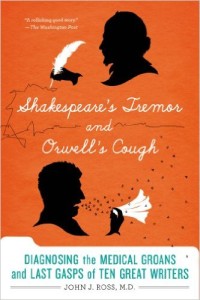Shakespeare’s Tremor and Orwell’s Cough
Shakespeare’s Tremor and Orwell’s Cough
The stereotype that writers are considered to be a bit odd or reclusive is  perhaps because they are odd and reclusive. John J. Ross, a physician at Boston’s Brigham and Women’s Hospital and guest editor for the prestigious quarterly Infectious Diseases Clinics of North America, has written a highly readable and entertaining book that delves into the lives and illnesses of some of our most famous and beloved authors. His book is an easy to read combination biography, review of classic literature, and medical journal.
perhaps because they are odd and reclusive. John J. Ross, a physician at Boston’s Brigham and Women’s Hospital and guest editor for the prestigious quarterly Infectious Diseases Clinics of North America, has written a highly readable and entertaining book that delves into the lives and illnesses of some of our most famous and beloved authors. His book is an easy to read combination biography, review of classic literature, and medical journal.
I’ve spent my life deliberately avoiding reading Wuthering Heights and Jane Eyre but after reading the real life tragedies of the Bronte family, and learning these two classics are somewhat based on the realities of the sisters’ lives has piqued my interest. While tuberculosis stalked the reclusive family, Ross identifies enough traits to suggest that Emily Bronte had Asperger syndrome.
Jonathan Swift’s proclivities suggest Obsessive Compulsive Disorder based on his “abhorrence of filth”—filth apparently being the norm for the period—and his celibate life style. Even with his abstinence he managed to ruin the lives of two women.
Roth also sees bipolar disorder as a psychological malady of writers. In the case of Herman Melville, it seems to have been inherited from his father, Allan Melville. We are treated to a fair bit of senior Melville’s erratic life before delving into Herman’s. Of him, Roth writes, “Melville had two powerful risk factors for bipolar affective disorder; the loss of a parent in childhood, and a robust family history of mood disorders.”
We learn that Melville’s friend—perhaps intimate friend—Nathaniel Hawthorne also comes from a disrupted childhood, and exhibits a “pathological shyness consistent with social anxiety disorder, or social phobia.” Hawthorne’s behavior is such that he would “run into a field to avoid meeting strangers on a road” and avoid eye contact when dining or walking in public. According to his wife, “He hates to be touched.”
Apart from the psychological disorders of famous authors, there are the physical maladies, ranging from sexually transmitted diseases, perforated ulcers, blindness and deafness, to Jack London’s renal failure, undoubtedly brought on by a self-administered morphine overdose.
I found the history of medicine in this book to be both frightening and fascinating. Whether you favor Obamacare or not, we should be so grateful we live in the times that we do. There was no concept of germs, therefore surgeons saw no need to wash their hands while attending to multiple patients. If your disease didn’t kill you, the treatment often would. Medicines often included heavy doses of lead, arsenic, and mercury. It seems mercury was a very effective laxative in its day; the heavy liquid metal could push anything through the intestinal track.
John J. Ross’ Shakespeare’s Tremor and Orwell’s Cough is a fast, enjoyable read that is hard to put down.
Michael J. Tucker
Growing up in the cold northern climate of Pittsburgh, PA, and an only child, Mike was often trapped indoors and left to his own devices, where he would create space ships out of cardboard boxes, convert his mother’s ironing board into a horse and put on his Sunday suit and tie and his father’s fedora and become a newspaper reporter or police detective. This experience left him with an unlimited imagination and the ability to write electrifying short stories and novels.
Mike is the author of two critically acclaimed novels, Aquarius Falling and Capricorn’s Collapse. He has also published a collection of short stories entitled, The New Neighbor, and a poetry collection; Your Voice Spoke To My Ear. His poem, The Coyote’s Den, was included in the Civil War Anthology, Filtered Through Time.
He is a judge for the Janice Keck Literary Award, and the moderator of the Williamson County Library Writers’ Critique Group.
Reviewers of Mike’s novels have compared his writing to: Thomas Wolfe’s I Am Charlotte Simmons, and J. D. Salinger’s Catcher in the Rye. Albert Beckus, Professor Emeritus of Literature at Austin Peay University recently wrote of his novels: “They move naturalistically in the American literary tradition of Theodore Dreiser’s An American Tragedy, but with a twist…as found in The Great Gatsby.”
- Web |
- More Posts(22)